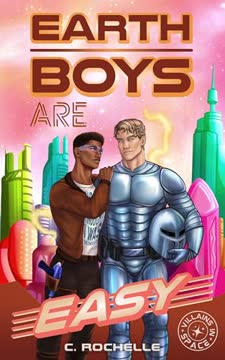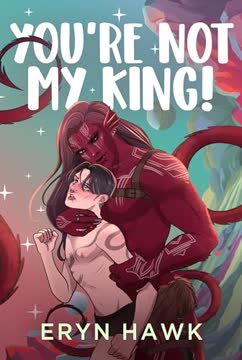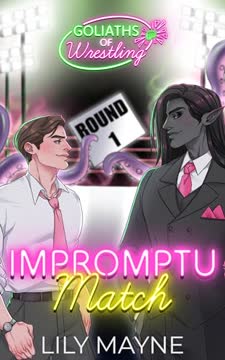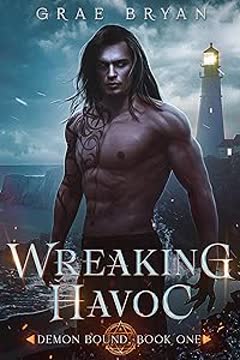Plot Summary
Alien Among Supers
Ziggy, a nonbinary, body-snatching Stellarian, has spent decades on Earth, blending in among superheroes to complete a mission for his militaristic homeworld. He's cold, calculating, and views most Earthlings as beneath him—except for Micah, a brilliant, sunshine-hearted supe who quickly becomes Ziggy's only real connection. Ziggy's mission is complicated by his growing fascination with Micah, whose warmth and curiosity begin to thaw Ziggy's centuries-old defenses. The story opens with Ziggy preparing to leave Earth, his mission incomplete, but unable to sever the bond he's formed with Micah. Their chemistry is undeniable, and Ziggy's internal struggle between duty and desire sets the stage for a collision of worlds, identities, and hearts.
Unlikely Earthly Attachments
When Ziggy attempts to leave Earth, Micah—using his own superpowered ingenuity—hitches a ride to Stellaria, tethering himself to Ziggy's most dangerous weapon. On Stellaria, Micah's presence is both a liability and a lifeline. Ziggy is forced to present Micah to the Astrum Force Command, the ruling body of his people, risking both their lives. Micah's intelligence and adaptability shine as he navigates the alien world, using humor and empathy to bridge the gap between them. Their forced proximity and mutual pining intensify, and the lines between captor and companion blur. Ziggy's carefully constructed detachment begins to crumble as he realizes Micah is not just a distraction, but a catalyst for change.
Astrum Force Judgment
Ziggy and Micah are summoned before the intimidating Astrum Force Command, where Ziggy must justify his actions and Micah's presence. The Command is both fascinated and threatened by Micah's unique abilities, and Ziggy's loyalty is tested. Through a tense exchange, Ziggy claims Micah as his "stellar collision"—a soulmate-like bond—both to protect him and to manipulate the Command's priorities. The gamble works: instead of punishment, they are assigned a joint mission, with Micah as Ziggy's weapons engineer. The ordeal cements their partnership, but also exposes the fragility of Ziggy's place in Stellarian society and the dangerous politics of his people.
Secrets of Stellaria
As Ziggy and Micah settle into their new roles, the emotional cost of their choices becomes clear. Ziggy's past—marked by abandonment, trauma, and a relentless drive to serve Stellaria—clashes with Micah's open-hearted approach to life. Their intimacy deepens, both physically and emotionally, as they share vulnerabilities and challenge each other's worldviews. Ziggy's discomfort with his own body and identity surfaces, while Micah's need to be useful and loved is laid bare. Together, they begin to question the narratives they've been given—about themselves, each other, and the true nature of Stellarian society.
Bazaar of Blood and Bonding
On a mission to a bustling intergalactic bazaar, Ziggy and Micah encounter the brutal realities of Stellarian life. A casual act of violence by Ziggy to protect Micah reveals the predatory instincts beneath his charming exterior. The pair navigate a world of danger, desire, and cultural dissonance, culminating in a public display of possessiveness and care. Micah's willingness to embrace the alien—both in cuisine and in Ziggy's true form—cements their bond. The bazaar becomes a crucible for trust, as they learn to rely on each other in a universe that rewards strength and cunning.
One Bed, Two Hearts
Aboard Ziggy's ship, the lack of personal space forces the two into nightly intimacy. What begins as a practical arrangement quickly becomes emotionally charged, as both struggle with their feelings and the fear of rejection. Their physical relationship escalates, blending tenderness with primal need, and the boundaries between dominance and vulnerability blur. Ziggy's alien instincts war with his desire to protect Micah, while Micah's longing for connection pushes him to demand honesty and openness. Their nights together become a safe haven, but also a battleground for trust and self-acceptance.
Commanders and Collisions
The Astrum Force Command assigns Ziggy and Micah a mission to hunt down Stellarian defectors on a primitive planet. To blend in, Ziggy adopts a monstrous new form, and Micah must play the role of his submissive "pet." The mission tests their adaptability, their willingness to play with power dynamics, and their ability to communicate without words. Public displays of dominance and submission become both a cover and a form of foreplay, as they navigate a society where agency and autonomy are luxuries. The mission's dangers force them to confront the reality of their bond and the lengths they'll go to protect each other.
Skinsuits and True Selves
In the privacy of Ziggy's ship, Micah demands to see Ziggy's true form, leading to a moment of vulnerability and acceptance. Ziggy reveals his starry, tendril-filled essence, and Micah's fascination and desire only grow. The pair experiment with new forms of intimacy, exploring the boundaries of pleasure, pain, and trust. Their willingness to embrace each other's alienness becomes a metaphor for radical acceptance, and the act of "possession" takes on new meaning. The chapter culminates in a merging of bodies and minds, as they discover the power of symbiosis—both as a weapon and as a source of healing.
Pirates, Predators, and Partners
Attacked by space pirates, Ziggy and Micah are forced to fight side by side, each using their unique abilities to survive. The battle is both literal and metaphorical, as they confront the dangers of the universe and the risks of loving someone who is fundamentally "other." The aftermath is a turning point: Ziggy's possessiveness reaches new heights, and Micah's ingenuity saves them both. Their partnership is tested and strengthened, and the experience leaves them more deeply entwined—physically, emotionally, and existentially.
Primal Play and Power
On their mission planet, Ziggy and Micah's roles as predator and prey become literal, as they engage in primal play that blurs the line between violence and intimacy. The experience is cathartic, allowing both to explore their deepest desires and fears in a context of absolute trust. The power dynamics shift fluidly, with each taking turns being dominant, submissive, protector, and protected. The chapter explores themes of consent, agency, and the healing potential of surrender, culminating in a reaffirmation of their bond and a new understanding of what it means to belong to each other.
Zeanidion Deceptions
Disguised as alien royalty, Ziggy and Micah infiltrate a society on the brink of collapse. Their cover as kings and consort is both a strategic necessity and a test of their ability to perform roles that challenge their self-perceptions. The experience forces them to confront issues of power, privilege, and responsibility, as well as the ethics of deception and survival. The chapter is a meditation on the masks we wear and the truths we hide, both from others and from ourselves.
Public Claims, Private Fears
A public display of sexual dominance at a royal gathering exposes the depth of Ziggy and Micah's connection, but also triggers fears of rejection, shame, and inadequacy. The aftermath is fraught with miscommunication and self-doubt, as both struggle to reconcile their desires with their need for acceptance. The chapter delves into the complexities of kink, consent, and the ways in which love can both heal and hurt. Ultimately, it is their willingness to be vulnerable—and to forgive each other—that allows them to move forward.
Chasing Defectors, Facing Truths
The mission to hunt down Stellarian defectors leads Ziggy and Micah to confront the lies at the heart of Stellarian society. They encounter rebels who challenge everything Ziggy has been taught about his people's purpose, history, and capacity for creation. The discovery that Stellarians were meant for more than war—meant to inspire, collaborate, and coexist—shakes Ziggy to his core. Micah's unwavering support and belief in his potential become the anchor that allows Ziggy to imagine a new future, both for himself and for his species.
Twin Temptations, Royal Revelations
In a moment of respite, Ziggy and Micah indulge in a fantasy of twin-bodied pleasure, exploring the limits of their connection and the possibilities of transformation. The experience is both erotic and symbolic, representing the merging of identities, the breaking of taboos, and the creation of something new. Their willingness to embrace change—within themselves and each other—becomes a microcosm of the larger revolution brewing among the Stellarians.
Knowledge and Betrayal
In the legendary Kaalanesean library, Ziggy and Micah discover evidence of a suppressed rebellion and the existence of "True Stellarians" living in exile. The revelation that Astrum Force Command has rewritten history, erased dissent, and weaponized their own people is both devastating and liberating. Ziggy is forced to confront the reality of his origins, the loss of his family, and the possibility that he was always meant to be more than a weapon. Micah's empathy and determination help him process the betrayal and imagine a new path forward.
The True Stellarians
Guided by clues from the library, Ziggy and Micah seek out the True Stellarians on Stellaria's moon. There, Ziggy is reunited with a parent he thought lost, and learns the truth about his heritage and the purpose of his existence. The True Stellarians reveal that their kind was meant to inspire, not conquer—that creation and destruction are two sides of the same cosmic coin. Ziggy's journey from outcast to chosen leader is both a personal and political awakening, as he is called to dismantle the corrupt system from within.
Symbiosis and Sacrifice
To infiltrate Astrum Force Command and expose their crimes, Ziggy and Micah undertake a dangerous symbiosis, merging their consciousnesses in a single body. The experience is both ecstatic and terrifying, as they navigate the boundaries of self and other, agency and surrender. Their love becomes both weapon and shield, allowing them to outmaneuver their enemies and broadcast the truth to the galaxy. The cost is high: Ziggy is forced to sacrifice himself in battle, leaving Micah to face the aftermath alone.
The Fall of Astrum Force
In the wake of Ziggy's apparent death, Micah must confront grief, guilt, and the burden of heroism. With the help of Ziggy's surviving parent and the True Stellarians, he discovers that a piece of Ziggy remains within him—a testament to their bond and the power of love to transcend even death. Together, they lead the revolution that topples Astrum Force Command, freeing Stellaria and its moons from tyranny. In the end, Ziggy returns, reborn through the resonance of their connection, and the two are finally able to claim their place as partners, lovers, and co-creators of a new future.
Characters
Ziggy Andromeda
Ziggy is a nonbinary Stellarian whose true form is a cluster of sentient stars, capable of inhabiting and manipulating other bodies. Raised as an orphan and denied a place in Stellarian society due to his parentage, Ziggy is fiercely intelligent, emotionally guarded, and deeply loyal to his homeworld—at least at first. His journey is one of self-discovery, as he moves from cold mercenary to passionate partner, learning to embrace vulnerability, pleasure, and the possibility of change. Ziggy's relationship with Micah is transformative, forcing him to confront his own worth, desires, and the lies he's been told. His arc is defined by the tension between duty and love, violence and creation, and the search for belonging in a universe that has always treated him as expendable.
Micah Salah
Micah is a brilliant, inventive, and emotionally open superhero from a powerful Earth family. Often overlooked and undervalued by his own clan, Micah compensates with humor, curiosity, and a relentless drive to be useful. His powers—manipulating inorganic matter—mirror his role as a bridge between worlds, able to adapt, create, and protect. Micah's psychological depth lies in his need for connection, his fear of abandonment, and his willingness to embrace the alien and the unknown. His relationship with Ziggy is both healing and challenging, as he pushes Ziggy to confront his own feelings and to imagine a life beyond violence. Micah's arc is one of self-acceptance, agency, and the radical act of loving without reservation.
Astrum Force Command
The Astrum Force Command is the governing body of Stellaria, enforcing a rigid, hierarchical order through fear, propaganda, and the rewriting of history. They are both a symbol and an instrument of systemic violence, using their power to suppress dissent, erase difference, and weaponize their own people. Their psychological profile is one of paranoia, control, and a desperate need to maintain the illusion of unity and strength. The Command's downfall is precipitated by their inability to recognize the power of love, creativity, and collaboration—a blindness that ultimately leads to their destruction.
Honnor (Ziggy's Parent)
Honnor is a True Stellarian who defected from Astrum Force, choosing exile and resistance over complicity. Their absence and presumed death haunt Ziggy, shaping his sense of self and his relationship to authority. Honnor's return is both a reckoning and a reconciliation, as they offer Ziggy the truth about his origins and the possibility of a different future. Their role is that of a guide, mentor, and symbol of the resilience of the oppressed.
Bron
Bron is a Stellarian who survived the massacre of his Star Unit and joined the True Stellarians in exile. He is both a witness and a participant in the struggle to reclaim Stellarian history and identity. Bron's psychological complexity lies in his ability to hold both trauma and hope, to recognize the necessity of both creation and destruction, and to support Ziggy and Micah in their revolution.
Nultek
Nultek is the advisor to the Kaalanesean royal twins, representing the value of history, memory, and the preservation of truth. Their role is to facilitate the transfer of knowledge, to support the protagonists in their quest for understanding, and to embody the importance of cultural continuity in the face of oppression.
Ferjun and Chooku (Kaalanesean Twins)
Ferjun and Chooku are the twin rulers of Kaalanesea, whose bodies are inhabited by Ziggy and used as a means of infiltration and survival. Their presence raises questions about agency, consent, and the ethics of symbiosis. They also serve as a metaphor for duality, unity, and the possibility of change through collaboration.
Zion Salah
Zion is Micah's older brother, a powerful supe and leader of the Salah clan. His relationship with Micah is marked by both support and neglect, reflecting the complexities of family dynamics and the pressures of legacy. Zion's arc is one of learning to recognize and value Micah's unique gifts, and to support his journey toward self-actualization.
Baltasar Suarez
Baltasar is a former enemy turned ally, whose own journey from villain to partner mirrors Ziggy's transformation. His relationship with Zion and Micah provides a counterpoint to the main romance, highlighting themes of redemption, forgiveness, and the power of chosen family.
Astrum Force Defectors
The various Stellarian defectors encountered by Ziggy and Micah represent the diversity of responses to oppression—some are broken, some are hopeful, and some are dangerous. Their stories serve as a chorus of voices, challenging the dominant narrative and offering alternative visions of what it means to be Stellarian.
Plot Devices
Symbiotic Bonding and Body-Swapping
The central plot device of the novel is the Stellarian ability to inhabit and manipulate other bodies, both as a means of survival and as a metaphor for the complexities of identity, gender, and desire. The act of "possession" is both literal and symbolic, raising questions about consent, autonomy, and the boundaries of self. The symbiotic bond between Ziggy and Micah—culminating in their merging of consciousness—serves as a narrative engine for both plot and character development, allowing for deep psychological exploration and the blurring of lines between lover, partner, and self.
Dual POV and Alternating Narration
The story alternates between Ziggy and Micah's points of view, using their distinct voices to highlight differences in worldview, experience, and emotional processing. This structure allows for dramatic irony, as the reader is often privy to feelings and motivations that the characters themselves are reluctant to share. The dual narration also serves to build empathy, as each character's vulnerabilities and strengths are revealed in turn.
Forced Proximity and "Only One Bed"
The trope of forced proximity—most notably the "only one bed" scenario—is used to accelerate the development of Ziggy and Micah's relationship. The lack of personal space forces them to confront their feelings, negotiate boundaries, and explore new forms of intimacy. The device is both comedic and poignant, serving as a microcosm of the larger themes of connection and vulnerability.
Power Dynamics and Role-Play
The novel makes extensive use of power play, both in sexual and nonsexual contexts. Role-play scenarios—ranging from pet/master dynamics to public displays of dominance—are used to explore issues of trust, consent, and the fluidity of power. The shifting dynamics between Ziggy and Micah mirror their internal struggles with control, autonomy, and the desire to be seen and accepted.
Foreshadowing and Symbolism
The recurring motifs of stars, resonance, and symbiosis are used to foreshadow key revelations and to symbolize the characters' journeys toward self-acceptance and belonging. The concept of the "stellar collision"—a soulmate-like bond—serves as both a plot device and a metaphor for the transformative power of love. The use of music, language, and alien technology further enriches the symbolic landscape, inviting the reader to consider the ways in which connection, creativity, and destruction are intertwined.
Revolution and the Rewriting of History
The plot is driven by the discovery of suppressed histories, the exposure of systemic lies, and the struggle to reclaim agency from oppressive regimes. The revolution against Astrum Force Command is both a literal and metaphorical battle, representing the fight for truth, justice, and the right to define one's own destiny. The act of broadcasting the truth to the galaxy is a narrative climax that ties together personal and political liberation.
Analysis
Earth Boys Are Easy is a riotous, subversive space romance that uses the trappings of sci-fi adventure and erotic comedy to interrogate deep questions of identity, power, and belonging. At its heart, the novel is a love story between two outsiders—one an alien mercenary shaped by trauma and duty, the other a superpowered human yearning for acceptance—who find in each other the courage to challenge the systems that have defined and confined them. Through inventive worldbuilding, sharp humor, and unapologetic kink, the book explores the ways in which intimacy can be both dangerous and redemptive, and how true connection requires the willingness to be seen in all one's alienness and vulnerability. The narrative's playful engagement with tropes—"only one bed," forced proximity, role-play—serves not just as fan service, but as a means of deconstructing and reimagining the possibilities of queer love and partnership. Ultimately, the story argues that revolution begins with the refusal to accept the stories we've been told about ourselves, and that the most radical act is to love—and be loved—without reservation, even (or especially) when the universe insists we are unworthy.
Last updated:
Review Summary
Earth Boys Are Easy received overwhelmingly positive reviews, with readers praising its humor, spicy content, and engaging characters. Many found Micah and Ziggy's relationship endearing and appreciated the balance of comedy and emotional depth. The space adventures and sci-fi elements were well-received. Some readers noted the book's high sexual content and occasional miscommunication tropes. While a few DNF'd due to personal preferences, most reviewers eagerly anticipate the next installment in the series.










